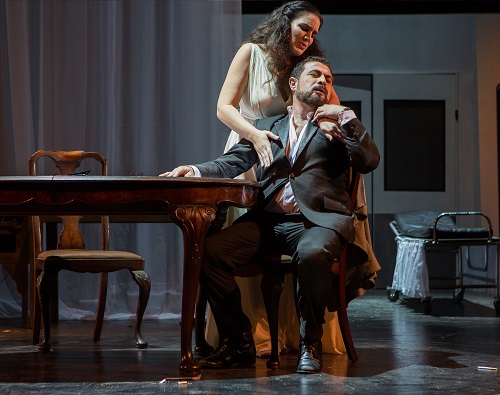 Argentina Gluck, Orfeo ed Euridice: Soloists, Chorus and Orchestra of Juventus Lyrica, Hernán Schvartzman (conductor), Teatro Avenida, Buenos Aires. 19.8.2016. (JSJ)
Argentina Gluck, Orfeo ed Euridice: Soloists, Chorus and Orchestra of Juventus Lyrica, Hernán Schvartzman (conductor), Teatro Avenida, Buenos Aires. 19.8.2016. (JSJ)

Cast:
Orfeo: Martín Oro
Eurídice: María Goso
Amore: Victoria Gaeta
Production:
Director/costumes: María Jaunarena
Sets/lighting: Gonzalo Córdova
Chorus: Hernán Sánchez Arteaga
A violinist does some work on his latest composition. He then puts his instrument away in its case and departs. Suddenly a shot rings out… then flashing lights… then a woman is wheeled in on a trolley surrounded by a team of medics, who frantically try to save her by means including several shocks to the heart. But it is in vain and she is eventually pronounced dead. Was it an accident… suicide… or murder?
No, not the start of an Agatha Christie play but of Juventus Lyrica’s new production of Orfeo ed Euridice – and likely its most radical, certainly in the past few years.
As should be evident, this was a modern production – but more than that, there weren’t any of the dances that are traditional. Instead producer María Jaunarena introduced selected ‘Orphic’ texts, which were spoken by a group of actors. And there was even a young Orfeo who made an appearance.
Well, a producer can take a text and present it literally as written, however in-credible. Or as is more usually done these days can adapt, justifying it, much like with statistics, with suitable philosophical or psychological arguments. While the ‘modern’ was novel and acceptable, the ‘radical’, although creative, wasn’t, for this reviewer anyway. The spoken words with their accompanying projections, with their length and timing and the additional characters on stage, effectively amounted to a play within the opera, ultimately detracting from rather than adding to the overall experience.
That said the young Ms Jaunarena has some interesting ideas, even if not always working for everyone, and no doubt will continue to surprise and challenge us in future productions.
On to the musical aspects and once again on the podium was Hernán Schvartzman, now resident in The Hague, who has made the baroque something of a speciality – and it showed with the precision and momentum he brought. Personally, I would have preferred “Che farò senza Euridice?” a shade slower to more effectively convey Orfeo’s grief, but that is a minor quibble when the whole is considered.
Counter-tenor Martín Oro is perhaps better known outside Argentina than within and as a relatively infrequent performer locally, it was a treat to see him in the role of Orfeo (this the 1762 version). As a violinist himself the opening portrayal was appropriate and he brought depth and intensity to the role, most comfortable in the middle register.
María Goso, who we saw earlier in the year in the title role of the Merry Widow, sung with richness and warmth, while Victoria Gaeta was a fresh voiced and boyish Amore. The chorus trained by Hernán Sánchez Arteaga was on good form – but was that one of the female members adding to the mod with a breastfeed?
Jonathan Spencer Jones
